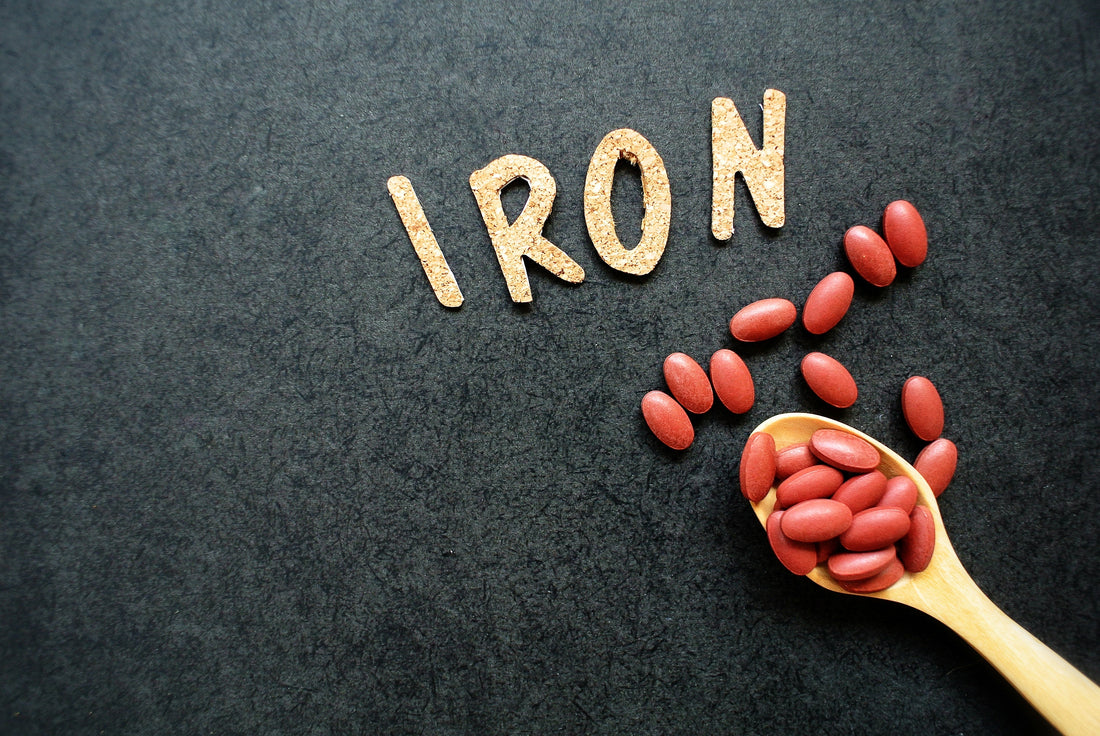Introduction
Many people who take an iron supplement complain about a common side effect: constipation. In fact, iron causes constipation because part of it is not absorbed by the body and slows intestinal transit.
However, it is possible to continue benefiting from iron’s health benefits without experiencing this discomfort. Proper hydration, a fibre-rich diet, and choosing gentler iron supplements, such as bisglycinate, often help prevent this problem.
Why iron supplements may cause constipation, practical ways to avoid it, and which health products can help you better tolerate your treatment.
Why Does Iron Cause Constipation?
Iron is an essential mineral for the human body. It plays an important role in oxygen transport and the prevention of anaemia, making it central to maintaining good health. However, many people find that taking iron supplements leads to constipation and digestive discomfort.
This is explained by the fact that part of the ingested iron is not absorbed by the intestine. The surplus remains in the digestive tract, where it can irritate the lining and slow transit. Stools then become harder and more difficult to pass, which explains why iron is often said to cause constipation.
However, there are different forms of supplements, and not all cause the same effects. Ferrous sulfate, very common and inexpensive, is often the one that causes the most digestive issues. In contrast, iron bisglycinate is generally better tolerated and leads to less constipation. Finally, some newer formulas, such as polysaccharide iron, have been designed to facilitate absorption and reduce discomfort.
By choosing appropriate health products and adjusting the dose with the help of a professional, it is often possible to benefit from iron without these side effects.
Common Side Effects of Iron Supplements
Taking iron supplements helps correct a deficiency and restore energy, but these products can cause certain digestive discomforts. Constipation is the most frequent side effect, but it is not the only one.
The most common reactions include:
-
bloating or a feeling of heaviness after meals,
-
sometimes painful abdominal cramps,
-
nausea or mild stomach discomfort,
-
darker stools, harmless but often surprising,
-
a metallic taste in the mouth.
The severity of these effects depends on several factors:
-
the prescribed dose,
-
the form of iron chosen (sulfate, bisglycinate, polysaccharide…),
-
individual digestive sensitivity.
These discomforts are generally temporary and disappear over time or after a treatment adjustment. If symptoms persist, it is preferable to consult a healthcare professional to explore other product or dosage options.
How to Prevent Constipation Caused by Iron Supplements?
The good news is that there are several simple ways to limit the most common side effect of iron supplements. By adopting good habits and choosing the right health products, it is possible to continue treatment without digestive discomfort.
1. Adjust Your Diet
-
Drink enough water (6 to 8 glasses per day) to support transit.
-
Eat more fibre through fruits, vegetables, whole grains, and legumes.
-
Include foods rich in vitamin C (citrus fruits, peppers, strawberries) that promote iron absorption.
2. Choose the Right Supplement Form
-
Ferrous sulfate is effective but often difficult to digest.
-
Iron bisglycinate is generally better tolerated and causes less constipation.
-
Polysaccharide or liposomal iron complexes can also reduce digestive issues.
3. Adjust the Dose and Timing
-
Start with a lower dose and then increase it gradually.
-
Split the daily dose into two intakes to improve tolerance.
-
Take iron with a light snack if your stomach is sensitive.
4. Use Complementary Health Products
-
Probiotics can support the balance of the gut microbiome.
-
Gentle laxatives or natural remedies (prunes, ground flax seeds, psyllium) help prevent constipation.
-
Some supplements combine iron with ingredients that facilitate transit, which improves tolerance.
By combining these strategies, it is possible to effectively reduce the risk of constipation while benefiting from the health effects of iron supplements.
When Should You Consult a Healthcare Professional?
Constipation related to iron supplements is common and generally mild. However, if discomfort persists despite proper hydration, a fibre-rich diet, and the use of complementary health products, it is advisable to consult. A doctor or pharmacist can adjust the dose, recommend another form of iron, or suggest follow-up suited to your situation.
Conclusion
Taking an iron supplement can sometimes lead to constipation because part of the unabsorbed iron slows intestinal transit. The most common forms, such as ferrous sulfate, are often responsible for these effects, while alternatives like bisglycinate or polysaccharide complexes are generally better tolerated.
The main side effects observed are constipation, but also bloating, cramps, nausea, and sometimes darker stools. Fortunately, several solutions exist to continue treatment without discomfort.
In most cases, these adjustments are enough to better tolerate iron and avoid constipation. If discomfort persists, it is recommended to consult a healthcare professional to adapt the treatment.


